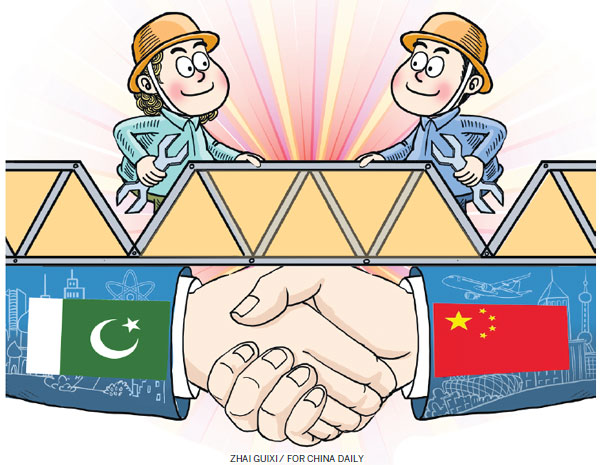By Muhammad Asif Noor
The China-Pakistan Economic Corridor has transformed Pakistan’s economic and industrial landscape. The first phase of the corridor, a pivot of the China-proposed Belt and Road Initiative, was completed in October 2019, which incidentally has been declared by both countries as the “Year of Industrial, Socioeconomic and Agriculture Cooperation”.
The 22 early harvest projects completed during the first phase will help Pakistan meet its energy and infrastructure requirements thanks to nationwide connectivity. Work is now in full swing on the corridor’s second phase which focuses on industrialization, socio-economic and agricultural cooperation, and consolidation of development in diverse sectors. Important steps in this phase include the establishment of special economic zones across Pakistan.
CPEC changing Pakistan’s industrial landscape
On Nov 9, the Pakistani government hosted a Joint Cooperation Committee in Islamabad to monitor and evaluate the progress of the corridor project. The committee was set up after Pakistani Prime Minister Imran Khan visited China in October to broaden interaction between the two countries’ leaderships.
A CPEC Authority was established on the eve of Prime Minister Khan’s visit after Pakistani President Arif Alvi promulgated and approved the CPEC Authority Ordinance 2019. The establishment of this authority reflects Pakistan’s commitment to fully implement the multibillion dollar strategic project. The authority is a single-window institution that will address all CPEC-related issues, remove the primary bottlenecks and speed up important business procedures and processes. This has already boosted Chinese investor confidence and expedited the project’s pace.
The Joint Cooperation Committee also approved the Gwadar Master Plan, apart from signing two important memorandums of understanding. The Multan-Sukkur Motorway (M5) project, one of the largest and inaugurated recently, will soon become a lifeline for transporting goods and services.
Last month, President Alvi chaired the Pakistan-China Agricultural Cooperation Forum, attended by a large number of agri-based traders, which showed that cooperation has extended to the grassroots level. Agriculture, which is at the center of Pakistan’s economy, will get a boost through the Belt and Road Initiative, especially the access that new, improved road and rail networks will provide to farmers.
All these milestones point to the fact that the change of government in Pakistan does not affect its rock solid ties with China, as they are based on mutual trust and historical affinity.
Government-level cooperation apart, there is also people-to-people cooperation. Business and industries in the two countries are increasingly connected. Thriving links also exist between education institutions, media houses, hospitals, students, faculties and more.
Pakistan-China ties are a role model for the world. Though the two countries have little in common at the societal level, an iron bond links their hearts and souls.
The Gwadar deep seaport is a jewel of the CPEC, which in turn is like a crown for the Belt and Road Initiative. In the words of Chinese State Councilor and Foreign Minister Wang Yi: “If BRI is like a symphony involving and benefiting every country, the construction of CPEC is a sweet melody of the symphony’s first movement”. Pakistan is a market of 220 million people, 70 percent of them young. It also has a huge skilled labor market. Such a hardworking population offers huge opportunities for the Chinese market and businesses.
To genuinely reap the fruit of prosperity and enhance further cooperation, Pakistan is adjusting itself at various levels, marred as it is by corruption, nepotism and weak institutions, in order to build its economic and political infrastructure.
Because of such drawbacks, Pakistan has been approaching the International Monetary Fund since 1958. But relief from the IMF comes with strings attached, is short-lived, and burdens the common man.
In contrast, there are no strings attached to the help from China – on the corridor and the initiative – making it a win-win proposition for all. There is a concept of shared destiny. And the corridor will definitely help strengthen Pakistan’s economy and generate wealth.
Although it took some time to complete the first phase of the corridor, as it involved a lot of planning and implementation, in the second phase, Pakistan will see a faster pace of technological and industrial development by Chinese companies.
Nevertheless, there is a strong need to improve people-to-people ties through regular engagement. There is also a need to connect with the regional and local media outlets to highlight the development taking place on the ground. The CPEC and the Belt and Road Initiative offer huge prospects for development, and China and Pakistan are linked through these initiatives at the right time given that the fourth industrial revolution has been changing the international landscape.
The author is director of the Institute of Peace and Diplomatic Studies and secretary-general of the Pakistan Shanghai Cooperation Organization Friendship Forum.
The author contributed this article to China Watch exclusively. The views expressed do not necessarily reflect those of China Watch.
Courtesy China Daily.










